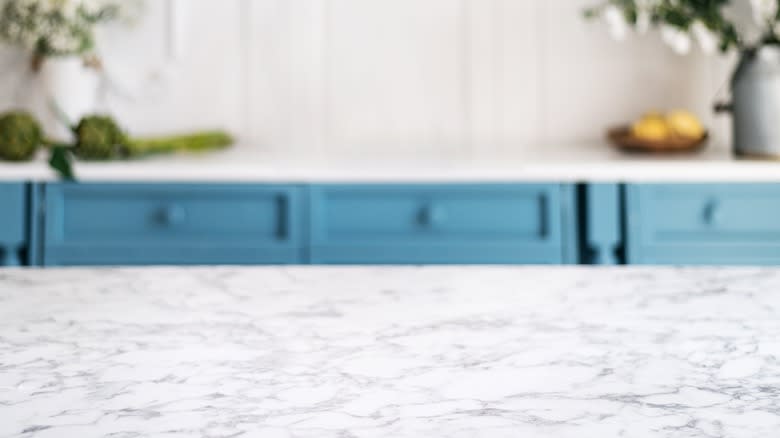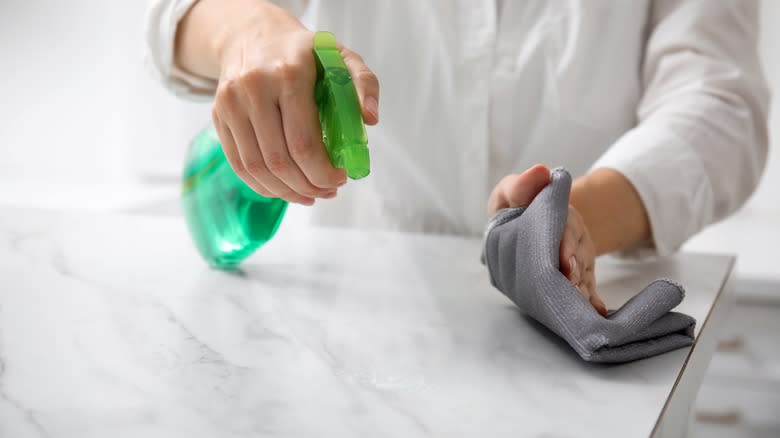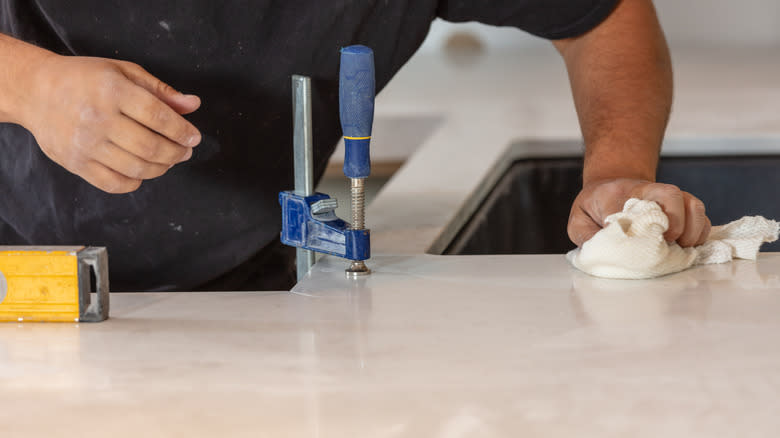The Biggest Issue With Using Marble Countertops In Your Kitchen

There is no question that marble exudes luxury. It is coveted as a building material, especially to grace kitchen counters and backsplashes. It is also a naturally cool material, perfect for those who need cool surfaces for making pies and the like -- although, for others, a Ziploc hack using ice will still make rolling dough easier. But, even though marble is strong, the biggest issue with using it for countertops in the kitchen is that it can stain relatively easily compared to other materials.
Being a natural material, marble is porous. It may not be immediately obvious, but upon close inspection, little holes are visible in marble even with the naked eye. Imagine spilling red wine over a white t-shirt and having the liquid absorb through and between all the fibers. The same red wine spilled over a marble countertop will make its way into all the nooks and crannies of the stone in much the same manner. The downside is that you cannot exactly load a marble counter into the washing machine, resulting in a stain that can be permanent.
Thankfully, there are ways to help prevent this staining from happening, and the main method takes place the moment the marble countertop is installed: Seal it.
Read more: The Best Way To Clean That Nasty Grease Off Of Your Kitchen Cabinets
Dealing With Spills

Sealing a marble countertop is ideally done by the professional who is building or renovating your kitchen, though it is possible to do it yourself. There are many types of sealers on the market, and the best option is to use impregnating sealers that are food-safe and repel both oil and water. It is obvious why using a food-safe sealer in a food prep environment is ideal, and being able to repel oil and water means that it will help prevent these liquids from even reaching the marble. As for the "impregnating" part, it just means that the sealer will go slightly beyond the marble surface (instead of remaining right on top), helping to ensure that stains do not get absorbed into the material's pores.
Unfortunately, even though you are as careful as possible, accidents can happen, and spillage may still occur on your marble countertop. If the unfortunate happens, it's best to clean the spills immediately with a microfiber cloth and dish soap. If the stain remains, Architectural Digest recommends cleaning the marble with a hydrogen peroxide solution between 3 to 12%, mixed with a few drops of ammonia.
A Long-Lasting And Elegant Material

Another thing that commonly happens to marble is something called etching. What this means is that a corrosive substance has essentially eaten away at the surface of the stone, and marble is particularly susceptible to etching from acidic liquids. This means that a mixture of salt and lemon cannot be used to clean it, and neither can the simple kitchen cleaning standby of vinegar, as both lemons and vinegar are acidic. To prevent corrosion, always make sure to use cutting boards and plates to separate acidic ingredients from marble countertops. That said, minor etching still might happen, which can be carefully buffed out using #0000 steel wool.
Regular maintenance is important to promote the longevity of marble surfaces. Resealing marble countertops every year can help prevent stains and etching, though kitchens subject to a lot of use might need their countertops resealed every six months. While it may be finicky to care for marble, its timeless allure makes it all worth it for proud homeowners.
Read the original article on Daily Meal.